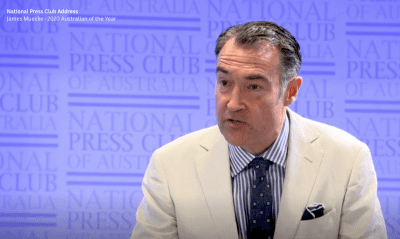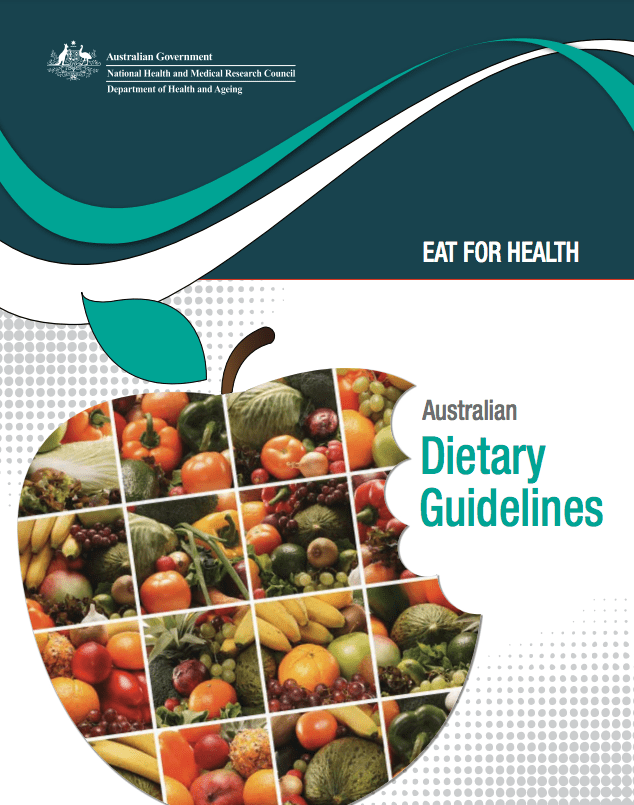WHEN your mission in life is to protect and save people’s sight, it is impossible to find the words to describe how it feels to have to remove a patient’s eye, especially when they have been needlessly blinded by a preventable man-made dietary disease such as Type 2 Diabetes.

Opthamologist Dr James Muecke addressing the National Press Club in Australia in December 2020. Image: ABC television.
This is how 2020 Australian of the Year and eye surgeon Dr James Muecke introduced a presentation to the National Press Club in Canberra late last year, in which he set his own sights on what he describes as Australia’s flawed, biased and unscientific Australian Dietary Guidelines.
Dr Muecke says 40 years of misguided ‘healthy eating’ advice have led to a dietary disaster in Australia and an explosion in rates of chronic disease including diabetes, now leading the cause of blindness in this country.
Type 2 diabetes is a preventable disease. So why would anyone knowingly put themselves at risk of such a devastating illness, he asked?
Because, in his view, most people are not aware that the diet they have been consuming for the past 40 years may be causing them harm – a diet that they have been told to consume, a diet shaped by Australia’s official Dietary Guidelines (ADGs)
The ADGs tell Australians to eat less saturated fat, “yet there is no evidence to suggest the natural saturated fat in our diet is linked to cardiovascular disease”, he said.
“Indeed, such fats are critical to our health, to our survival.”
Such fats are critical to our health, to our survival
Discouraging consumption of foods containing natural saturated fats has led to the production of thousands of low fat products, many of which are highly processed and loaded with sugar and refined carbohydrates to enhance the flavour lost by removing fat.
While the guidelines state the link between dietary saturated fat and cardiovascular disease is “well established”, Dr Muecke contends there is “no evidence whatsoever” to link whole fat dairy, unprocessed red meat and eggs with heart attack, stroke, and Type 2 diabetes.
“Foods that have been demonised by our guidelines since their inception,” he said.
“This lack of evidence was well known in 2009 when the last review commenced, (but) this critical piece of evidence was seemingly ignored.
“Instead of promoting healthy saturated fats the guidelines encouraged the eating of unhealthy polyunsaturated oils, and this in turn has led to the boom in the production and consumption of margarines and seed oils, industrially produced fats which have been linked to cardiovascular disease,” he said.
In a 30 minute address to the National Press Club, Dr Muecke said the ADGs were flawed, biased at critical multiple levels, conflicted by industry funding, and borne out of weak and unreliable epidemiological data that was “certainly not as robust as we have been led to believe”.
ADGs ‘very powerful’
The 226-page document sits quietly and unceremoniously on the Federal Department of Health website but is “very powerful”.

The Australian Dietary Guidelines can be viewed at the Federal Department of Health website at this link
It determines what is eaten in our schools, hospitals, prisons, defence forces, in childcare and aged care facilities, and helps inform our army of health care professionals, health educators, Government policy makers and the food industry.
In effect the ADGs have “been shaping what Australians should eat for the past four decades”.
“The ADGs state that they’re intended for the average healthy person,” Dr Muecke said.
“However when over two thirds of Aussie adults and one third of Aussie kids are overweight and obese, the average Aussie is anything but healthy.”
Explaining why he believes the ADGs are compromised, Dr Muecke said the review of the literature underpinning the guidelines at their last iteration in 2013 was tendered by the NHMRC to the Dietary Association of Australia, which he said was heavily conflicted by funding from the “ultra-processed foods industry” at the time it was awarded the tender.
Critical research questions that guided the literature review were biased and appeared to have been written by the DAA to manipulate an intended outcome, he said.
The effect of this was to “sway the literature search away from the health benefits of red meat and towards the health benefits of grain based foods”.
Supermarket shelves and checkouts were now loaded with “diabolical foods” packed with nutrient deficient, energy dense calories. Ultra-processed foods now constituted half our current diet, Dr Muecke said.
“For the first time in our history we are overfed but undernourished.”
Type 2 diabetes is reversible with diet
Furthermore, Dr Muecke added that Type 2 diabetes was not only a preventable disease, but a reversible disease.
He said there were three proven methods for putting type 2 diabetes into remission, including with a low carbohydrate diet, yet there is no mention of the potential for remission on the website of Diabetes Australia, the peak body for patients with diabetes in Australia.
This was despite there now being over 100 controlled clinical trials to support the fact that a very low calorie diet or low carbohydrate diet works to either prevent Type 2 diabetes or to put it into remission.
“Why is remission not an objective of our national approach to this disease?,” he asked.
“Should this critical information not be shouted from the roof tops?”
Should this critical information not be shouted from the rood tops?
He said the current medical model also favoured giving “deadly drugs” to patients with Type 2 diabetes.
“Among the list of corporate partners of Diabetes Australia, the majority are pharmaceutical companies who have a vested interest in keeping people medicated with Type 2 diabetes, who perhaps don’t like the idea of dietary solutions that aren’t making them profits.”
Dr Muecke said he has met with the keeper of the ADGs, the Federal Government’s National Health and Medical Research Council (NHMRC) to discuss his concerns, but the organisation disagreed with his view that the guidelines held any bias. He said also brought his concerns to the attention of Health Minister Greg Hunt but despite initial interest no follow up action has eventuated.
Best advice: eat a balanced diet
Asked by a journalist at the National Press Club lunch for his advice to families on what they should be eating, Dr Muecke advised a balanced diet of animal and plant based foods.
“As humans we evolved to eat meat, we evolved as omnivores, and so I think a diet that comes from varied sources gives us the most nutrient rich diet we can enjoy.
“To have this balance of plant based foods and animal based foods is critical to our health and survival and ultimately to our enjoyment as well.”
ADGs currently under review, new version due 2024
The first iteration of the ADGs was published in 1982. The guidelines are updated every 10 years.
The current version, which is the fourth update, was published in 2013.
In November last year the NHMRC announced it was embarking on the latest review process and sought expressions for an expert committee to review and update the Guidelines, with the fifth iteration currently scheduled for release by early 2024.
The NHMRC said the Australian Dietary Guidelines use the best available scientific evidence to provide information on the types and amounts of foods, food groups and dietary patterns that aim to promote health and wellbeing, reduce the risk of diet-related conditions and reduce the risk of chronic disease.
ADGs: More information on the ADG review process is available on the NHMRC website.
Full address: To view Dr Muecke’s full address to the National Press Club in Canberra visit the ABC iview website here
Related article: Australian Dietary Guidelines: what they say about red meat
